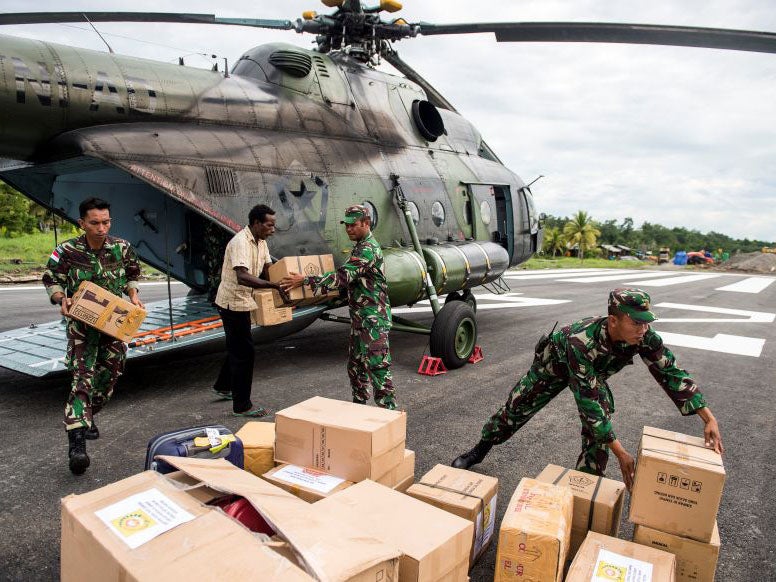BBC journalist ordered to leave Indonesian province because her tweets 'hurt soldiers' feelings'
Reporter ejected after posting about malnutrition in Papua

Your support helps us to tell the story
From reproductive rights to climate change to Big Tech, The Independent is on the ground when the story is developing. Whether it's investigating the financials of Elon Musk's pro-Trump PAC or producing our latest documentary, 'The A Word', which shines a light on the American women fighting for reproductive rights, we know how important it is to parse out the facts from the messaging.
At such a critical moment in US history, we need reporters on the ground. Your donation allows us to keep sending journalists to speak to both sides of the story.
The Independent is trusted by Americans across the entire political spectrum. And unlike many other quality news outlets, we choose not to lock Americans out of our reporting and analysis with paywalls. We believe quality journalism should be available to everyone, paid for by those who can afford it.
Your support makes all the difference.A BBC journalist was forced to leave the Papua region of Indonesia after her tweets offended the country’s military.
The Asmat area in the east of the country has been hit by a malnutrition and measles crisis that has left more than 60 infants dead.
Rebecca Henschke, who is the Indonesia editor for the BBC, was covering the issue when she posted the tweets that got her expelled.
Papua is one poorest parts of the country and authorities there restrict media output because of sensitivities over an independence movement.
Though Indonesian President Joko Widodo had vowed to lessen restrictions on press freedom, human rights activists have said that foreign journalists still face difficulties and are blocked from reporting on some issues.
Soldiers are supporting humanitarian efforts and helping to deliver aid to the area, which is struggling to deal with the health crisis.
Ms Henschke, who has been based in Indonesia for 12 years, posted a picture on Twitter of some supplies and said: “This is the aid coming in for severely malnourished children in Papua – instant noodles, super sweet soft drinks and biscuits.”
The country’s military released a statement which claimed that Ms Henschke’s tweets has ”hurt the feelings” of the country’s soldiers, who were helping out.
Colonel Muhammad Aidi, a spokesman for the Papua military said: “(The food and drink) that she took the picture of at the speedboat pier are not donations or aid. It was merchandise from merchants that was incidentally there.”
Mr Aidi also described two other tweets as misleading.
Ms Henschke, a Jakarta-based Australian citizen, later took down the photograph and tweeted: “Adding important NOTE: Other sources say this is NOT aid but normal supplies. Huge relief effort underway here.”
The journalist was denied permission to continue her coverage, while being questioned by security forces on Friday. A statement from the military said she was escorted to Timika and held by immigration officers.
She allegedly deleted another tweet which showed soldiers in a photo with a caged bird, ABC News reported, which made it seem like the soldiers were involved in buying wildlife illegally – another claim that Colonel Aidi refuted.
A further tweet that remains on the journalist’s account said: “Children in hospital eating chocolate biscuits and that’s it.”
Ms Henschke declined to comment but a BBC spokesperson said via email: “A BBC team on a deployment to Papua province has now returned to Jakarta.
“They had the necessary documentation and the authorities were aware of their visit. The BBC respects local laws wherever it operates.”
Some have suggested that the malnutrition crisis in Asmat could be partly due to some of the area’s population relying increasingly on rice over nutritious tubers, as well as energy drinks and instant meals. A lack of vaccinations has also been blamed.
Critics in Papua have criticised officials for failing to care for the region, which is mainly full of Christians in a country that is primarily Muslim.
Andreas Harsono, of Human Rights Watch, said the expulsion of Ms Henschke was evidence that the area still remained problematic for foreign media to report on.
“She had her travel permit – the only Indonesian area where foreign journalists need to get a permit to visit – and still got intimidation for a single tweet,” said Mr Harsono.
Additional reporting by Reuters.
Join our commenting forum
Join thought-provoking conversations, follow other Independent readers and see their replies
Comments